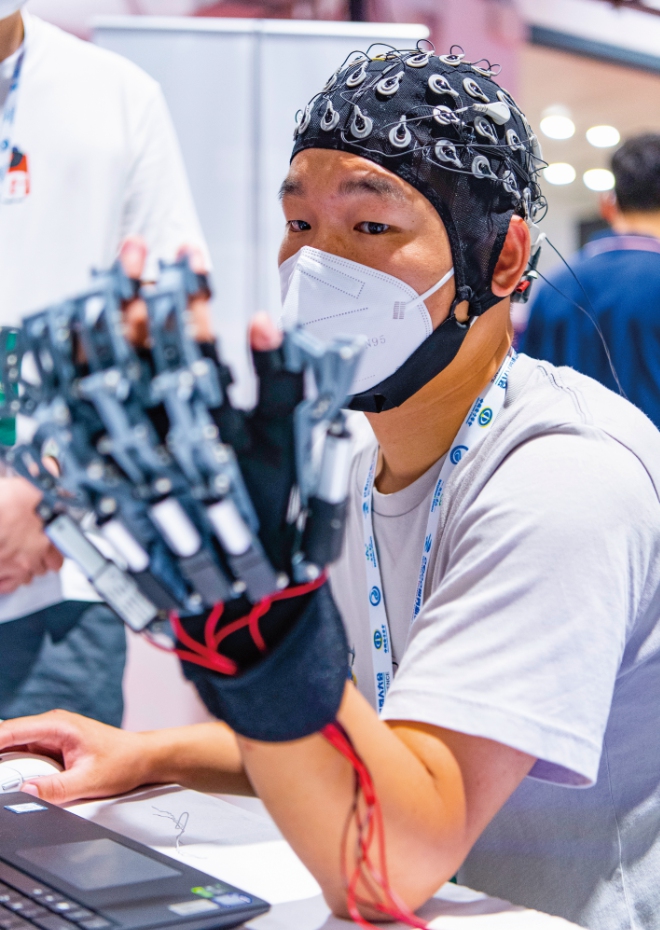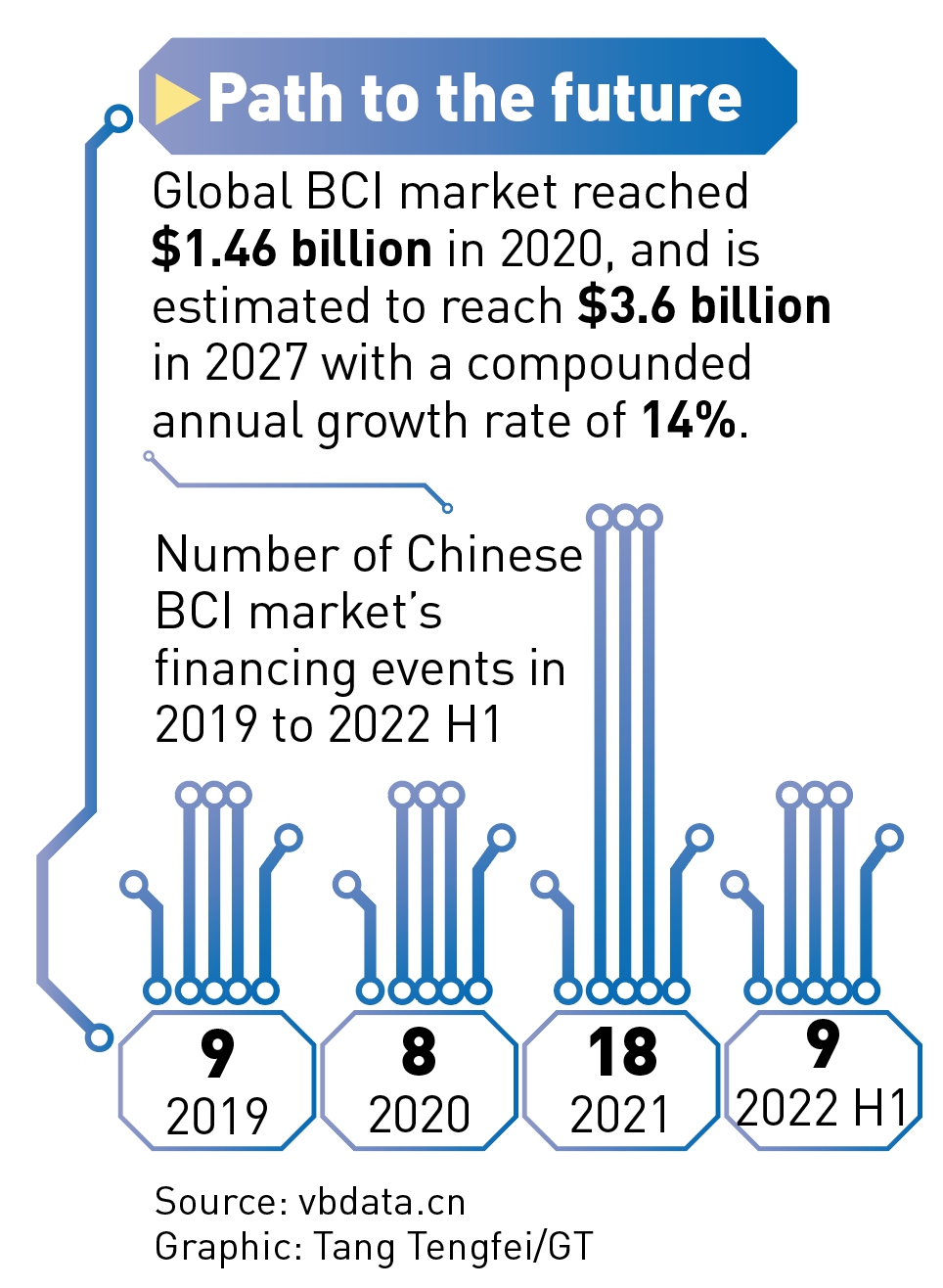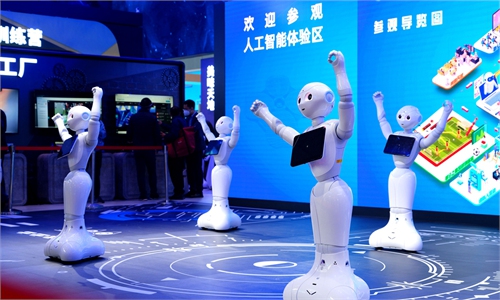Chinese companies ramp up for emerging BCI technology, ready for larger market
China in the nascent stages of emerging technology, ready for a larger market

Photo: VCG
China's brain-computer interfaces (BCI) development has gained marked progress, according to an industry insider, as domestic firms continue to churn out products and services in the emerging field that could be worth of trillions of dollars over coming decades.
BCI is a relatively novel term and most of the people probably learned about it from Tesla CEO Elon Musk, who co-founded San Francisco-based Neuralink, which develops implantable BCI.
Globally, there are a number of frontrunners in the sector. In July, New York-based Synchron announced the first human BCI implant in the US, making a "milestone" for scalable BCI devices, according to media reports.
However, Chinese companies are also relatively advanced, with several noteworthy achievements already being publically disclosed.
In mid-November, a group of scientists unveiled a software system called MetaBCI - China's first open-source software platform for BCI research. The project was developed by Tianjin University in partnership with two firms.
The Python-based, internally developed software platform provides one-stop information processing support for BCI research, encompassing functions that would otherwise require a number of software programs that each focuses on one step of the interactive process, such as stimulation demonstration and data processing to executive, and facilitates the multi-party cooperation in this field.
The software platform's whole-of-process approach could help save research dollars and accelerate the commercialization process, said Xu Minpeng, technical director of the MetaBCI project and vice dean of the Academy of Medical Engineering and Translational Medicine in Tianjin University, adding that global BCI technology development has entered an explosive period in which the technology is being integrated into real world scenarios.
The development at MetaBCI is coupled by other companies in the emerging field.
In September, NeuroXess, a Shanghai-based life science company focusing on flexible electrode BCI technologies, announced what it claimed to be the nation's first medical-grade minimally invasive implant, the Shanghai Observer reported.
Moreover, the company said it has been conducting clinical application tests for patients with major neurological diseases such as high paraplegia and ablepsia at some hospitals in Shanghai, according to the report.
In January, the Chinese BCI start-up said it has raised 97 million yuan ($15.2 million) in funding from major investors Shanda Group and Sequoia Capital.
Besides invasive implants, progress has also been made using other approaches.
At Tianjin University, scientists have developed rehabilitation robots empowered by BCI technology to help stroke victims regain motion functionality. "Certain products have entered the industrialization phase," Xu said.
Chinese research institutes have churned out non-invasive specialized BCI chips for computers and signal collection systems. Some brain electrical signal collection systems have obtained registration certificates as approved medical devices from the national regulator, Xu said.

A researcher tests a BCI device at the 2022 World Robot Conference held in Beijing. Photo: VCG
Industry pioneersWang Peng, an assistant professor at the Gaoling School of Artificial Intelligence at the Renmin University of China, told the Global Times on Monday that China was among the world's first echelon of countries in BCI research & development (R&D) due to a number of factors including the level of input and government support.
Wang said progress in software infrastructure such as those achieved by MetaBCI had laid a solid foundation for future research work, as researchers can share and co-develop programs for the emerging science, which probably won't see large scale industrialization in the coming decades but which still contains huge potential.
Many localities also specifically made development BCI a clear goal in their 14th Five-Year Plan (2021-25) under policy goals linked to artificial intelligence (AI).
Chinese industry experts said in neurotechnology, there is no apparent gap between domestic and overseas players thanks to China's year-long investment in the field and governmental priority placed on AI and related sectors, according to the Shanghai Observer report in September.

Graphic: Tang Tengfei/GT
Wide applications
Wang said while the current efforts to tap BCI potential are mostly focused in the initial-phase testing and basic R&D, and the first application of BCI knowledge will be in medical and clinical scenarios. Wang noted that BCI has a wide range of application scenarios and great potential in health and medical care, education and entertainment industry once the cost is driven down.
Industry experts said that BCI technology is likely to be first used in medical sector for the recovery of motion functionality, bridging communication disorder, and other neurological and psychological applications. There are also consumer-end wearables that could monitor the wearer's electroencephalogram to improve level of focus and sleep quality. Other systems could be used to monitor the mood of students for better interactive experience during the course of their studies.
"I expect there will be more application scenarios in health and consumer market in coming years," Xu said.
In entertainment, the technology will enable players to bypass handheld devices and exercise control directly with their brain in combination with AR or VR technologies, Xu said.
According to a report by the China Academy of Information and Communication Technology, neurotechnology related sectors, including neuro-modulation and BCI, reflect trillions of yuan in market potential in China, based on the number of impaired people, rate of diseases and an aging population.
Wang said strong R&D intensity and targeted deployment of resources offered to the emerging science will consolidate China's leading status in the field.




